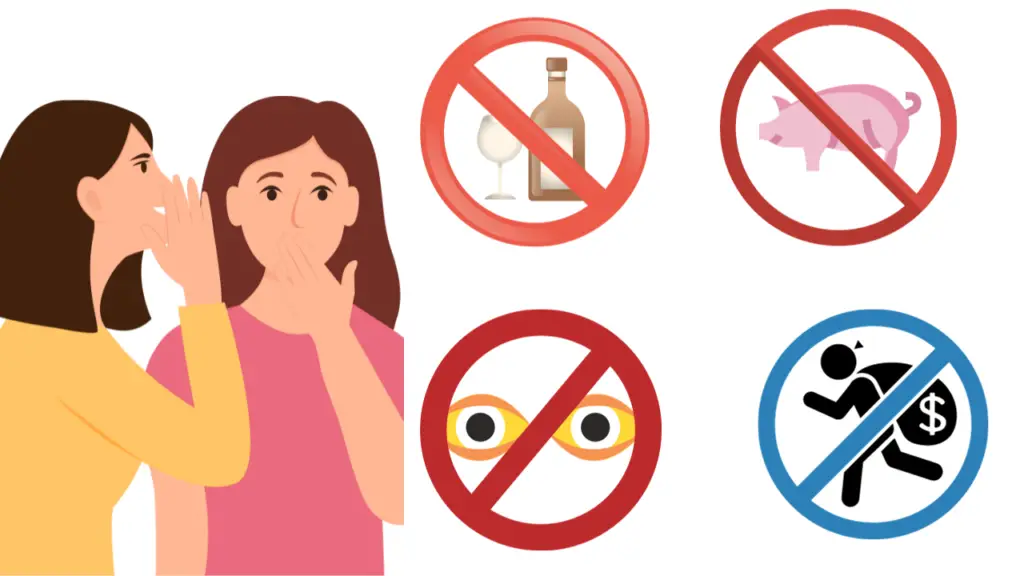Haram Things In Islam
"An In-Depth Exploration of Prohibited Actions According to Islamic Teachings"

Haram Things In Islam
Haram things in Islam refer to actions, behaviors, or substances that are strictly forbidden by Islamic law (Sharia). These prohibitions are based on the Quran, Hadith, and Islamic jurisprudence. Examples of haram things include alcohol consumption, gambling, eating pork, charging or paying interest (riba), adultery, idolatry (shirk), and engaging in slander or backbiting.
- Is it Haram to Say Bad Words? |Exploring Religious Perspective | 2023
- Is Dropshipping Halal |Understanding Perspective|2023
- Is Bitmoji Haram? | Reason | Full Guide | 2023
Introduction:
In Islam, there are clear guidelines and principles that guide the lives of Muslims. One of the fundamental aspects is the concept of “Haram,” which refers to things that are strictly forbidden. This article will delve into various haram acts in Islam, shedding light on why they are considered as such and the consequences of engaging in them.

Things Haram In Islam
- Consumption of Alcohol and Intoxicants:Alcohol and other intoxicants are unequivocally haram in Islam. These substances alter one’s state of mind, impair judgment, and can lead to sinful behavior. The Quran explicitly prohibits intoxicants in Surah Al-Baqarah (2:219), emphasizing the harm they cause.
- Usury (Riba):Engaging in usurious transactions or charging interest on loans is considered haram. Islam encourages fair and ethical financial dealings, and riba is viewed as exploitative and detrimental to society. The Quran warns against it in Surah Al-Baqarah (2:275-279).
- Pork Consumption:Pork is forbidden in Islam, and its consumption is haram. This prohibition is based on various verses in the Quran, including Surah Al-Baqarah (2:173) and Surah Al-An’am (6:145), due to the health risks associated with pork and the need for maintaining purity.
- Adultery and Fornication:Engaging in sexual relations outside of a lawful marriage is strictly prohibited in Islam. Adultery and fornication are considered grave sins. The Quran condemns these acts in Surah Al-Isra (17:32) and emphasizes the importance of modesty and chastity.
- Theft and Robbery:Stealing or engaging in robbery is a violation of others’ rights and property, and it is haram in Islam. The Quran addresses theft in Surah Al-Ma’idah (5:38) and underscores the significance of honesty and respecting the property of others.
- Backbiting and Slander:Speaking ill of others behind their backs, spreading false rumors, and engaging in slander are all haram in Islam. The Quran warns against such behavior in Surah Al-Hujurat (49:11) and encourages positive communication and empathy.
- Idolatry (Shirk):Associating partners with Allah (God) is considered the gravest sin in Islam. Shirk contradicts the core belief in the oneness of God (Tawhid). The Quran emphasizes monotheism and denounces idol worship in numerous verses, including Surah Al-Baqarah (2:21-22).
- Consuming Halal (Permissible) Meat:Muslims are required to consume only halal meat, which is slaughtered in accordance with Islamic principles. Consuming non-halal or improperly slaughtered animals is haram. The Quran outlines the guidelines for lawful consumption in Surah Al-Baqarah (2:168).
Conclusion:
In Islam, the concept of haram serves as a moral compass, guiding Muslims toward a righteous and virtuous way of life. The prohibitions mentioned in this article are not meant to restrict but to promote a just and ethical society. Avoiding haram acts is a fundamental aspect of a Muslim’s faith, and understanding these prohibitions is essential for practicing Islam with sincerity and devotion.
FAQs – Haram Things In Islam
What does “Haram” mean in Islam?
“Haram” in Islam refers to actions, behaviors, or substances that are strictly forbidden by Islamic law (Sharia). Engaging in haram activities is considered sinful and goes against the teachings of Islam.
Why are some things considered Haram in Islam?
Things are considered haram in Islam because they are believed to harm individuals, society, or one’s spiritual well-being. The prohibition is often rooted in the Quran, Hadith (sayings and actions of Prophet Muhammad), and Islamic jurisprudence.
Is consuming alcohol haram in Islam?
Yes, consuming alcohol and intoxicants is haram in Islam. The Quran explicitly prohibits intoxicants in Surah Al-Baqarah (2:219) due to their negative effects on judgment and behavior.
What is the Islamic stance on gambling (games of chance)?
Gambling is considered haram in Islam because it relies on chance and can lead to financial ruin and addictive behavior. Muslims are encouraged to engage in activities that are based on skill and effort, not chance.
Why is pork forbidden in Islam?
Pork is haram in Islam because it is considered impure and unhealthy. The prohibition is based on various Quranic verses, including Surah Al-Baqarah (2:173) and Surah Al-An’am (6:145)
Is interest (riba) allowed in Islam?
No, charging or paying interest (riba) on loans or financial transactions is haram in Islam. Islam encourages ethical and interest-free financial dealings.
What is the punishment for adultery and fornication in Islam?
Adultery and fornication are considered grave sins in Islam. The punishment for these acts can vary, but in Islamic law, the punishment may include flogging or stoning to death in specific circumstances.
What is the significance of avoiding slander and backbiting in Islam?
Islam places great importance on honest and respectful communication. Slander (making false statements about someone) and backbiting (speaking ill of someone behind their back) are considered sinful and can harm individuals and relationships.
Why is idolatry (shirk) the gravest sin in Islam?
Idolatry (shirk) is the act of associating partners with Allah (God), which contradicts the core Islamic belief in the oneness of God (Tawhid). It is considered the gravest sin because it undermines the central monotheistic principle of Islam.
How can one avoid haram activities and lead a halal (permissible) life in Islam?
To avoid haram activities, Muslims should educate themselves about Islamic law, strive to live a righteous life, and seek guidance from religious scholars. It’s also important to maintain regular prayer and seek forgiveness for past sins through repentance and sincere remorse.





